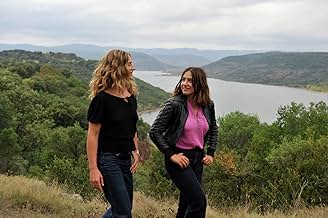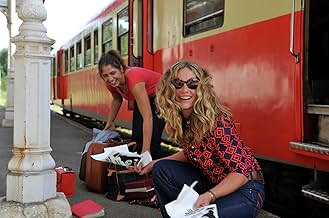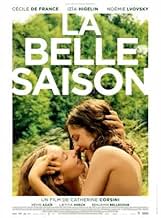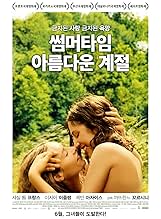IMDb-BEWERTUNG
6,7/10
6044
IHRE BEWERTUNG
Eine junge Frau zieht vom französischen Land nach Paris und beginnt eine leidenschaftliche Liebesaffäre mit einer feministischen Hauptdarstellerin in diesem Drama, das im Frankreich der 1970... Alles lesenEine junge Frau zieht vom französischen Land nach Paris und beginnt eine leidenschaftliche Liebesaffäre mit einer feministischen Hauptdarstellerin in diesem Drama, das im Frankreich der 1970er Jahre spielt.Eine junge Frau zieht vom französischen Land nach Paris und beginnt eine leidenschaftliche Liebesaffäre mit einer feministischen Hauptdarstellerin in diesem Drama, das im Frankreich der 1970er Jahre spielt.
- Regie
- Drehbuch
- Hauptbesetzung
- Auszeichnungen
- 3 Gewinne & 8 Nominierungen insgesamt
Cécile de France
- Carole
- (as Cécile De France)
Natalie Beder
- Marie-Laure
- (as Nathalie Beder)
Nathalie Lovigui
- Une militante MLF dans l'amphi
- (as Nathalie Lovighi)
Empfohlene Bewertungen
LGBT rights are more relevant than ever. In several countries, unfortunately, the trend is towards more difficult living conditions for gays and transgender people. Seen in such a perspective, the plot of this film remains relevant, despite the fact that it depicts a summer in 1971.
Although perhaps the problem here is something we have seen in many films, the film is experienced as both engaging and well told.
I sat thinking when I saw this movie; how many such fates exist? Both before and now? That people cannot live their lives to the fullest, in fear of condemnation from their surroundings. There are probably a lot of them, and in that way such films become important and unfortunately relevant. For such films we need. We need to be reminded of how the world treats and views queer people. In addition to a strong and pointed action, the film is also beautifully filmed, well directed and with good actors who get both convincing and engaging.
An enjoyable film, with some great performances; but less travelled country roads should be rather more bumpy.
While a far from novel story, the three female leads (Izïa Higelin, Cécile de France and Noémie Lvovsky) give pitch perfect performances.
Where this film falls down is in giving the two lovers, far too smooth a ride. If you're fighting for freedom, surely the establishment would offer far more resistance? Here, the revolutionaries hardly seem to experience any push-back. There's one bump in the road, but that's really it.
While a far from novel story, the three female leads (Izïa Higelin, Cécile de France and Noémie Lvovsky) give pitch perfect performances.
Where this film falls down is in giving the two lovers, far too smooth a ride. If you're fighting for freedom, surely the establishment would offer far more resistance? Here, the revolutionaries hardly seem to experience any push-back. There's one bump in the road, but that's really it.
Watched on Apple TV. I rented it for 2 dollars. Not a bad deal. I don't have much faith in French movies because most of them have too much nudity, or are highly sexual or are very boring. I watch them and I am like "what did I just watch". I thought it would be a typical French erotic soft porn movie but I was wrong. Not too many explicit scenes, and the plot was okay. Same sex relationship/marriage was strongly opposed in the 70s in French and it was prohibited in every country too I think. This movie shows how two women from two different classes try to break the rules to tell the world that homosexuality should be legal. Two different women with different personalities but share some similar beliefs.
The film, set in 1971, tells the story of the lesbian relationship between Delphine, a farmer's daughter, and Carole, a feminist activist, who meet when Delphine moves to Paris. This does not, however, mean that Delphine is an innocent country girl seduced by the more sophisticated Parisian older woman. It is the exclusively lesbian Delphine who is more experienced than the bisexual Carole- indeed, Carole's previous relationships have all been with men, and she has a boyfriend at the time when she meets Delphine.
Things change when Delphine's father Maurice has a stroke and Delphine, an only child, is forced to return to help her mother Monique run the farm. Carole follows her, but they quickly realise that pursuing their relationship in the countryside will not be easy. In the cosmopolitan atmosphere of Paris, at least in the radical circles in which Carole and Delphine move, lesbianism is widely accepted. In "La France Profonde" it is not. Delphine's parents have no idea that she is a lesbian, although some people in the area are beginning to suspect, and they believe that she will marry Antoine, a local boy who is interested in her.
The climax of the film comes when Monique finds Delphine and Carole in bed together. Believing that the older woman has corrupted her daughter, Monique angrily orders Carole to leave her house and never return. Delphine must decide where her future lies. This is not simply a question of deciding between her love for Carole and her loyalty to her family. Delphine has also realised that she loves the countryside, rural traditions and the life of the farm. She therefore also has to decide between her love for Carole and the profession and lifestyle in which she feels most comfortable. I won't give away the ending by revealing which choice she makes.
The film was shown in Britain as "Summertime", but I prefer the original French title "La Belle Saison", partly to avoid confusion with the David Lean film from 1955 with Katharine Hepburn, partly because it seems to me to have more layers of meaning. The romance between Delphine and Carole can be seen as the "beautiful season" of their lives; perhaps the so-called "sexual revolution" of the late sixties and early seventies also seemed like a "beautiful season" to those who lived through it.
Being a heterosexual British male, I am probably not the demographic at which a French lesbian-feminist film is aimed, but I must say that I enjoyed "La Belle Saison". When you can see past some of its preaching, especially on the abortion issue, it emerges as a very good film. Both the lead actresses, Cécile de France and Izïa Higelin, play their parts very well, and the attractive photography of the French countryside- it was shot in the Limousin- give it something of the look of a British "heritage cinema" drama. The period angle reminds us that the past- even the relatively recent past within my own lifetime- is (as L P Hartley said) another country where they do things differently. One likes to think that fifty years on things would be easier for Delphine and Carole than they were in 1971. Perhaps in France, even rural France, they would be, but in some parts of the world I am not so sure. The film reminded me of a recent British film, "Tell It to the Bees", another period drama (in that case set in the fifties) about a lesbian couple confronted with a difficult life choice. Like that film, "La Belle Saison" is a sensitively made, well-acted human drama and a plea for tolerance. 7/10.
Things change when Delphine's father Maurice has a stroke and Delphine, an only child, is forced to return to help her mother Monique run the farm. Carole follows her, but they quickly realise that pursuing their relationship in the countryside will not be easy. In the cosmopolitan atmosphere of Paris, at least in the radical circles in which Carole and Delphine move, lesbianism is widely accepted. In "La France Profonde" it is not. Delphine's parents have no idea that she is a lesbian, although some people in the area are beginning to suspect, and they believe that she will marry Antoine, a local boy who is interested in her.
The climax of the film comes when Monique finds Delphine and Carole in bed together. Believing that the older woman has corrupted her daughter, Monique angrily orders Carole to leave her house and never return. Delphine must decide where her future lies. This is not simply a question of deciding between her love for Carole and her loyalty to her family. Delphine has also realised that she loves the countryside, rural traditions and the life of the farm. She therefore also has to decide between her love for Carole and the profession and lifestyle in which she feels most comfortable. I won't give away the ending by revealing which choice she makes.
The film was shown in Britain as "Summertime", but I prefer the original French title "La Belle Saison", partly to avoid confusion with the David Lean film from 1955 with Katharine Hepburn, partly because it seems to me to have more layers of meaning. The romance between Delphine and Carole can be seen as the "beautiful season" of their lives; perhaps the so-called "sexual revolution" of the late sixties and early seventies also seemed like a "beautiful season" to those who lived through it.
Being a heterosexual British male, I am probably not the demographic at which a French lesbian-feminist film is aimed, but I must say that I enjoyed "La Belle Saison". When you can see past some of its preaching, especially on the abortion issue, it emerges as a very good film. Both the lead actresses, Cécile de France and Izïa Higelin, play their parts very well, and the attractive photography of the French countryside- it was shot in the Limousin- give it something of the look of a British "heritage cinema" drama. The period angle reminds us that the past- even the relatively recent past within my own lifetime- is (as L P Hartley said) another country where they do things differently. One likes to think that fifty years on things would be easier for Delphine and Carole than they were in 1971. Perhaps in France, even rural France, they would be, but in some parts of the world I am not so sure. The film reminded me of a recent British film, "Tell It to the Bees", another period drama (in that case set in the fifties) about a lesbian couple confronted with a difficult life choice. Like that film, "La Belle Saison" is a sensitively made, well-acted human drama and a plea for tolerance. 7/10.
'La Belle Saison' is set in 1971 when women were asserting their rights – as indeed a lot of folk were doing the same to a world that was not really ready. This is set against the lives of Delphine from a rural farming family. She escapes to Paris where she happens to cross paths with the fiery Carole (Cécile de France – 'Meserine').
Then amidst the heady cocktail of feminism, liberation and radical politics they expressed themselves sexually – which of course was revolutionary. Yes they set about challenging the heterosexual orthodoxy - and found more than just a political statement in that they fell for each other.
Now there is tons more to this inspiringly brilliant film. It is made in such a way that the characters come alive and are completely believable. All the performances are outstanding and the period detail is really good too. The hair and fashions as well as the vehicles are spot on – and some nice Janis Joplin songs on the soundtrack too. There is so much here to like that it is a very easy job to recommend.
Then amidst the heady cocktail of feminism, liberation and radical politics they expressed themselves sexually – which of course was revolutionary. Yes they set about challenging the heterosexual orthodoxy - and found more than just a political statement in that they fell for each other.
Now there is tons more to this inspiringly brilliant film. It is made in such a way that the characters come alive and are completely believable. All the performances are outstanding and the period detail is really good too. The hair and fashions as well as the vehicles are spot on – and some nice Janis Joplin songs on the soundtrack too. There is so much here to like that it is a very easy job to recommend.
Wusstest du schon
- WissenswertesDirector Catherine Corsini stated that she named the two main characters Carole and Delphine after real life artists and feminists Carole Roussopoulos and Delphine Seyrig.
- PatzerAfter a swim in the pond, the girls lay out to take some sun. As Carole lays naked on the blanket resting her head on Delphine, her arms are raised and we can see she does not have any underarm hair. As the girls start to kiss and caress Carole's armpit is exposed again but this time full of underarm hair.
- VerbindungenReferenced in Théo & Hugo (2016)
- SoundtracksL'Hymne du MLF, d'apres Le Chant des Marais
(Johann Esser/Wolfgang Langhoff/Rudi Goguel)
With the kind permission of Edition Peters Group
All rights reserved
Top-Auswahl
Melde dich zum Bewerten an und greife auf die Watchlist für personalisierte Empfehlungen zu.
- How long is Summertime?Powered by Alexa
Details
- Erscheinungsdatum
- Herkunftsländer
- Offizieller Standort
- Sprachen
- Auch bekannt als
- Summertime
- Drehorte
- Haute-Vienne, Frankreich(scenes in the country)
- Produktionsfirmen
- Weitere beteiligte Unternehmen bei IMDbPro anzeigen
Box Office
- Budget
- 4.800.000 € (geschätzt)
- Bruttoertrag in den USA und Kanada
- 35.322 $
- Eröffnungswochenende in den USA und in Kanada
- 15.413 $
- 24. Juli 2016
- Weltweiter Bruttoertrag
- 3.778.938 $
Zu dieser Seite beitragen
Bearbeitung vorschlagen oder fehlenden Inhalt hinzufügen

Oberste Lücke
What is the Japanese language plot outline for La Belle Saison: Eine Sommerliebe (2015)?
Antwort
![Bande-annonce [OV] ansehen](https://m.media-amazon.com/images/M/MV5BMzZiZTVkNWItZGNjYS00ZDY2LWFkOGItZjhkNTk2NDQ3ZDE2XkEyXkFqcGdeQXRyYW5zY29kZS13b3JrZmxvdw@@._V1_QL75_UX500_CR0)
































